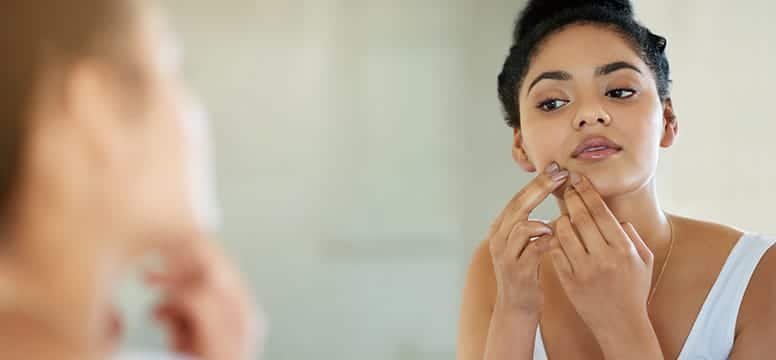
Acne is one of the primary reasons patients in the Boca Raton area will book an appointment with a dermatologist. When acne is becoming an embarrassing or unsightly issue, patients are encouraged to make an appointment with us to determine the best course of treatment.
Who Is At Risk For Developing Acne?
Acne used to be considered a condition that only affected teenagers going through puberty. However, more and more adults are dealing with this condition well into their 20s and 30s.
What Types of Acne Are Treated at The Rendon Center?
Treatment for acne varies depending on several factors. First, diagnosis of the specific type of acne can make way for proper treatment solutions. Types of acne that may be present include:
- Acne vulgaris
- Comedones
- Blackheads
- Whiteheads
- Papules
- Pustules
- Nodules
- Cysts
- Acne conglobata
What Does Acne Treatment Involve?
Once the type of acne has been diagnosed, then our doctors can determine the severity of the condition. Severe cases may need more aggressive treatment than milder cases of acne. Mild cases are often improved with the development of a skincare regimen that includes mild cleansers and topical therapies. Severe cases may do well with topical treatment combined with systemic therapies. With a quality dermatologist, patients get on track with appropriate treatment and will notice a dramatic improvement over the course of time with good compliance.
What are My Acne Treatment Options?
Some treatment solutions patients might use in conjunction with their daily skincare routine include:
Why Choose Rendon Center for My Acne Treatment?
All of these services are readily available at the Rendon Center for Dermatology and Aesthetic Medicine. Patients can speak to their dermatologist about combining any of these treatments with their systemic and topical therapy for dramatic results in a shorter period of time.
What Causes Acne?
Acne occurs when follicles become clogged with dead skin cells, oil, and bacteria. These blockages result in blackheads, whiteheads, pustules, papules, and other types of pimples.
Many people experience more acne breakouts in their teens due to hormonal changes that cause an overproduction of sebum (oil) that clogs the pores. Some women also experience acne flare-ups during menopause, pregnancy, or at certain times in their menstrual cycles. Hormonal acne typically occurs in the T-zone (the nose, forehead, and chin).
Certain medications can also trigger acne. For example, those on testosterone replacement therapy often notice an uptick in hormone-related breakouts. Additionally, lithium has been linked to acne and other skin conditions, especially in the first six months of treatment.
Steroid acne is caused by prednisone and other corticosteroid medications. While this is sometimes called “bodybuilders acne,” these prescriptions are often taken for Cushing syndrome (AKA Cushing’s disease or Cushing’s syndrome), severe allergies, rheumatoid arthritis, and other medical conditions.
What Looks Like Acne But Isn’t?
Many conditions look like acne vulgaris but are really something else. If you have persistent acne that doesn’t improve with over-the-counter treatments, it’s important to seek a diagnosis from a qualified dermatologist since your skin condition could be one of these lookalikes.
Rosacea shares many symptoms with acne vulgaris, including inflammation, papules, and pustules. However, rosacea also includes erythema (reddening) caused by the dilation of superficial veins and is typically localized to the central face. While laser therapy, antibiotics, or retinoids like isotretinoin may help both skin conditions, some cases of rosacea will respond better to different topicals like metronidazole.
Fungal acne (AKA Pityrosporum folliculitis or Malassezia folliculitis) is often confused for acne vulgaris but is a separate condition that occurs when hair follicles become infected by Malassezia yeast. This typically causes red bumps that sometimes turn into whiteheads. Fungal acne is itchy, while acne vulgaris isn’t.
Risk factors for fungal acne include:
- Having a weakened immune system.
- Living in a humid climate (like Boca Raton, Florida).
- Taking antibiotics.
- Wearing tight clothing.
- Removing hair, which can damage follicles.
- Having a condition that causes excessive sweating (hyperhidrosis).
Treatment for Malassezia folliculitis is different from for acne vulgaris. Oral or topical antifungal medications can help clear this type of acne. At Rendon Center for Dermatology & Aesthetic Medicine, our experienced dermatologists can diagnose fungal acne through skin examinations using a Wood’s lamp or microscopic samples.
When Should I See A Dermatologist About Acne?
When a pimple pops up, most of us first reach for drugstore products to clear our skin. However, as anyone who’s tried every combination in the skincare aisle knows, over-the-counter solutions aren’t always effective.
If you have persistent acne that doesn’t clear up after six to ten weeks, our dermatologists can provide a customized treatment plan, which may include prescription medications, to balance and calm your complexion. They can also rule out any similar-looking skin conditions.
You’ll likely benefit from seeing a dermatologist for acne if any of the following apply to you:
- You’ve tried multiple treatments to clear your acne, but nothing works.
- Your acne occasionally clears, but breakouts follow these periods of calm skin.
- Your acne is cystic and painful.
- You have acne scars and want to avoid more in the future.
- You’re avoiding social activities because of the psychological impact of acne.
- You’ve noticed a sudden, unexplained change in your skin.
- You have persistent body acne that won’t clear with over-the-counter topicals.
Many people think their acne needs to be severe to seek treatment, but this isn’t the case. The dermatologists at Rendon Center for Dermatology & Aesthetics regularly treat mild, moderate, and severe acne.
Schedule A Consultation
Men and women located in the Boca Raton area interested in working with a dedicated team of dermatological professionals and finding successful treatments for acne conditions are welcome to contact this practice. Call 561-750-0544 or fill out the form on this page to schedule an initial consultation and evaluation and get on the road to achieving healthier, more beautiful skin!

